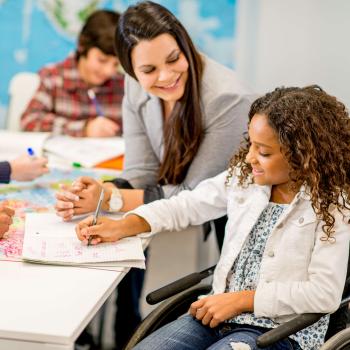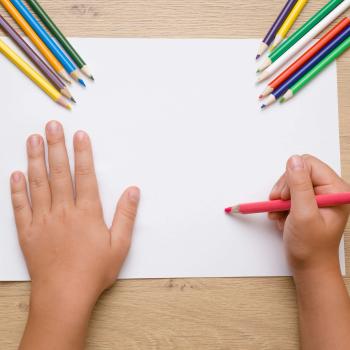Students write authentic newspaper stories, including learning about various aspects of newspapers, such as writing an article, online articles, newspaper reading habits, and layout and design techniques.

Creating a Classroom Newspaper
Grades
|
Manipulating Sentences to Reinforce Grammar Skills
9 - 12
Lesson Plan
|
Minilesson
Students manipulate sentences from books or magazines to examine changes in meaning and parts of speech.
Grades
|
Wartime Poetry: Working With Similes
3 - 5
Lesson Plan
|
Standard Lesson
Students analyze a photograph, brainstorm words to describe the characters' senses and feelings, work in pairs to describe a character's experience, and create a poem using their ideas and similes.
Grades
|
Guided Comprehension: Evaluating Using the Meeting of the Minds Technique
3 - 5
Lesson Plan
|
Recurring Lesson
Based on the Guided Comprehension Model developed by Maureen McLaughlin and Mary Beth Allen, this lesson introduces students to the strategy of evaluating, using the Meeting of the Minds technique.

Grades
|
Biography Project: Research and Class Presentation
6 - 8
Lesson Plan
|
Unit
Classroom biography study offers high-interest reading with a purpose, as students begin with inquiry and research, summarize and organize their information, and prepare oral presentations to share with the class.
Grades
|
Teaching Audience Through Interactive Writing
K - 2
Lesson Plan
|
Unit
Through interactive writing, students work together and then independently to create invitation letters for a group of their peers and their families.

Grades
|
Catching the Bug for Reading Through Interactive Read-Alouds
K - 1
Lesson Plan
|
Recurring Lesson
Students learn about story structure, new vocabulary, and a variety of reading strategies by participating in an interactive read-aloud of Miss Bindergarten Stays Home From Kindergarten by Joseph Slate.

Grades
|
Guided Comprehension: Knowing How Words Work Using Semantic Feature Analysis
3 - 6
Lesson Plan
|
Recurring Lesson
Based on the Guided Comprehension Model developed by Maureen McLaughlin and Mary Beth Allen, this lesson introduces students to the comprehension strategy of knowing how words work.

Grades
|
Let's Build a Snowman
K - 2
Lesson Plan
|
Minilesson
In this lesson, students use both fiction and nonfiction texts, the Internet, and a K-W-L chart to learn about how animals survive the winter.

Grades
|
Spelling Cheerleading: Integrating Movement and Spelling Generalizations
K - 5
Lesson Plan
|
Standard Lesson
"2-4-6-8, students will be spelling great" in this lesson that teaches the y rule for adding suffixes through cheering the spelling of words aloud, word sorts, and writing stories.

Grades
|
Using QARs to Develop Comprehension and Reflective Reading Habits
6 - 8
Lesson Plan
|
Recurring Lesson
Students are introduced to question-answer relationships (QARs). Using the QAR strategy, students identify different types of questions and learn how to determine the appropriate response for each question type.

Grades
|
Guided Comprehension: Summarizing Using the QuIP Strategy
3 - 6
Lesson Plan
|
Recurring Lesson
Students learn to use the QuIP (questions into paragraphs) comprehension strategy to organize information and then synthesize it in writing.

Grades
|
Guided Comprehension: Monitoring Using the INSERT Technique
4 - 6
Lesson Plan
|
Recurring Lesson
Based on the Guided Comprehension Model developed by Maureen McLaughlin and Mary Beth Allen, this lesson introduces students to the comprehension strategy of monitoring.

Grades
|
Guided Comprehension: Visualizing Using the Sketch-to-Stretch Strategy
4 - 6
Lesson Plan
|
Recurring Lesson
Guided comprehension moves your middle-grade students beyond decoding to become successful, independent readers. The sketch-to-stretch strategy encourages students to use "brain TV" to help them understand a text through visualization.

Grades
|
Guided Comprehension: Making Connections Using a Double-Entry Journal
4 - 6
Lesson Plan
|
Standard Lesson
Based on the Guided Comprehension Model by Maureen McLaughlin and Mary Beth Allen, this lesson helps students learn three types of connections (text-to-text, text-to-self, and text-to-world) using a double-entry journal.

Grades
|
Guided Comprehension: Self-Questioning Using Question-Answer Relationships
3 - 6
Lesson Plan
|
Standard Lesson
Guided comprehension moves your students beyond decoding to become independent readers. Generating questions to guide reading helps readers make connections with the text and supports independent comprehension of new texts.

Grades
|
Guided Comprehension: Previewing Using an Anticipation Guide
3 - 6
Lesson Plan
|
Recurring Lesson
Based on the Guided Comprehension Model developed by Maureen McLaughlin and Mary Beth Allen, this lesson introduces students to the comprehension strategy of previewing.

Grades
|
Weather: A Journey in Nonfiction
K - 2
Lesson Plan
|
Unit
Questions about weather clear up when students use what they learned from their books to create a presentation to share with the rest of the class.

Grades
|
Using Writing and Role-Play to Engage the Reluctant Writer
3 - 5
Lesson Plan
|
Standard Lesson
What does the world look like through a javelina's eyes? Students become javelinas in this lesson when they analyze a character and write from his or her perspective.

Grades
|
Hey Diddle, Diddle! Generating Rhymes for Analogy-Based Phonics Instruction
1
Lesson Plan
|
Standard Lesson
Students practice matching rhyming words, apply phonological awareness to analogy-based phonics, and use the interactive Construct-a-Word to create rhyming words by adding a beginning consonant to a word ending.